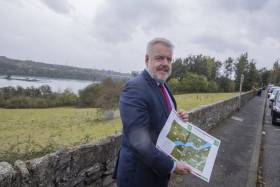Displaying items by tag: 3rd Bridge Crossing
#NewsUpdate - The First Minister of Wales, Carwyn Jones who visited Dun Laoghaire last week for the RMS Leinster centenary, the following day paid a visit to Anglesey in north Wales to announce the Purple option as the preferred route for the third Menai Strait (Afon Menai) crossing.
According to the Welsh Government the Purple option would see a new bridge constructed to the east of the existing Britannia Bridge. Additional facilities for pedestrians and cyclists will be included as part of the scheme.
An appraisal of the options revealed the Purple option provides the highest economic benefits, offers ‘high’ value for money and is the best performing in terms of highway alignment. It was also the most popular option of the public consultation with 25 per cent of respondents selecting it as their first choice.
As part of the next stages, a procurement exercise will take place to appoint Technical Advisors to develop the preliminary design and prepare for publication of draft Orders and an Environmental Statement.
Further analysis is also required as part of the next stage of development to determine which form of bridge is most suitable. The cost of the structure is dependent on this analysis.
First Minister Carwyn Jones said: “The A55 is important locally, nationally and internationally. It provides the main economic artery for North Wales and connects the region with the rest of Wales, the UK and Europe. (Afloat adds see related story on Brexit and the A55)
“The Britannia Bridge is the only section of the route which is single carriageway and we know this reduction in lanes leads to congestion at peak times and during the tourist seasons. There is very strong case for increasing capacity across the Menai and I am delighted the Welsh Government is taking action to address the issue.
“Based on the appraisal undertaken on the options, the Purple Option performs best and would be vital in improving journey times, strengthening the A55’s resilience, and ensuring safer travel across the Menai Strait.
“It will also provide economic benefits and ensure the route is fit for purpose as traffic volume is expected to increase over the years to come.”
For more on the development, click here.
























































